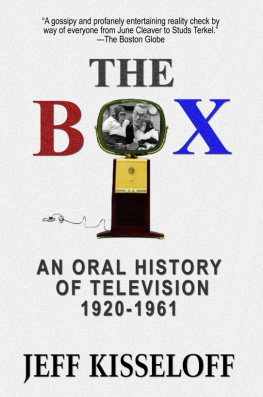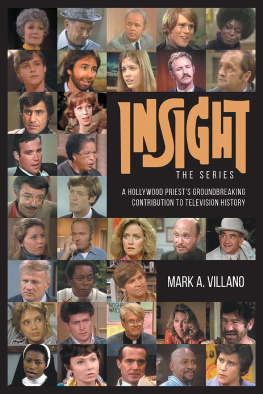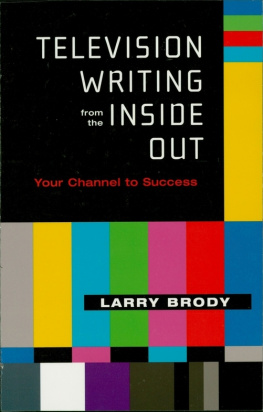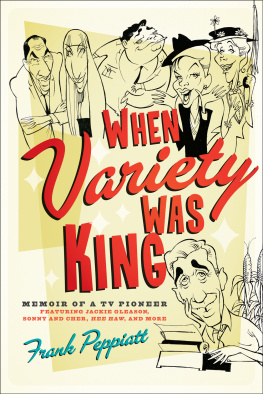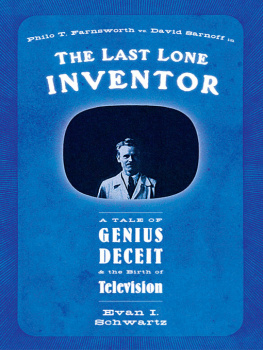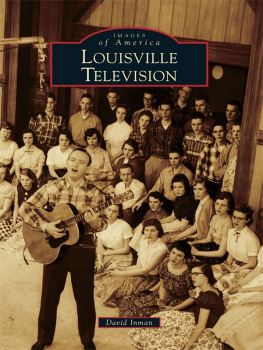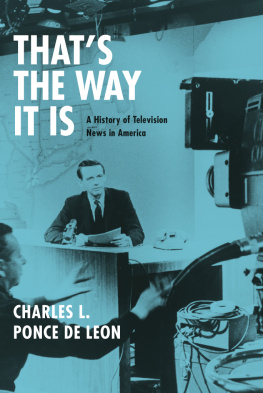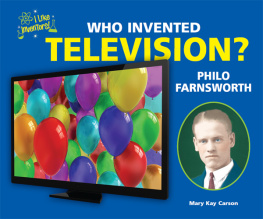THE BOX
by
JEFF KISSELOFF
Produced by ReAnimus Press
Other books by Jeff Kisseloff:
You Must Remember This: An Oral History of Manhattan from the 1890sto World War II
2013, 1995 by Jeff Kisseloff. All rightsreserved.
http://ReAnimus.com/authors/jeffkisseloff
Smashwords Edition Licence Notes
This ebook is licensed for your personal enjoymentonly. This ebook may not be re-sold or given away to other people.If you would like to share this book with another person, pleasepurchase an additional copy for each person. If you're reading thisbook and did not purchase it, or it was not purchased for your useonly, then please purchase your own copy. Thank you for respectingthe hard work of this author.
~~~
Jeff Kisseloff is the author of You Must Remember This: An OralHistory of Manhattan from the 1890s to World War II. He is aveteran reporter and editor and the grandson of one of thecountrys first TV dealers. He lives in New York City.
~~~
To my parents, for their love and theirtwenty-one-inch Zenith color console
~~~
Table of Contents
I would sit in that control room, and as it got closer to air youcould feel everything going softer and quieter. In front of mewould be the director and his associates and all the earphones,switches, and plugs. Outside that plate-glass window was thestudio. You could see the sets for your play. Finally, the lightingpeople would beam the sets, and the actors would come in and taketheir places in their costumes, standing quietly, waiting. In thatlast minute before you went on the air, you would watch the sweephand going around, and there would be absolute silence, nobodymoving. Then suddenly, the sweep hand would hit the hour, and youwould hear a crash of music, and the announcer saying, Live fromNew York, and you knew that your little play was going out tofifty million people. And nowhere have I ever felt a thrill likethat. I love the theater, but it beats opening night in the theaterevery time.
TAD MOSEL
INTRODUCTION
It says something about our society that ElvisPresley gets his face on a postage stamp while the memory of theman whose great invention beamed the swiveling pelvis into millionsof American homes is relegated mostly to Jeopardy! questions.
Philo Farnsworth is not the only television pioneerconsigned to the dustbin of the American psyche. This project wasin its embryonic stage when Dan OConnor, a retired NBC employee,offered to track down Robert Sarnoff, the former NBC president andson of the late David Sarnoff. The General, as he liked to becalled, was a founder of RCA, NBCs parent company, and its guidingspirit for forty-two years. He is easily the most important figurein the history of telecommunications.
After a few phone stops around the NBC offices, Danwas transferred to the personnel department. He explained onceagain that he needed to reach Robert Sarnoff. A silence at theother end of the line prompted Dan. You know who he is, dont you?Hes the Generals son.
There was another hesitation before the voice asked,How do you spell Sarnoff?
Dan never got the number, but he confirmed the sadfact that those who contributed so much to televisions developmenthave largely been forgotten. Few people know of Ted Smith, whobuilt the first television station in New York City; or Fred Coe,who opened the curtain on televisions Golden Age; or AlexAnderson, who gave us two of early televisions most belovedcartoon characters, Crusader Rabbit and Bullwinkle Moose.
When Sid Caesars name came up in a recentconversation with a friend of my own vintage, I could haveidentified the brilliant comedian as Juliuss Jewish cousin andgotten the same disinterested shrug. The irony is that Sarnoff andthe magnetic power of the device he helped develop and market soskillfully must take some of the blame for people who think Dr.Quinn, Medicine Woman provides them with all the history they needto know.
The comedian Red Buttons made a career out ofmoaning about how unappreciated he is. Nobody ever gave me adinner, he whines at the Friars Club roasts. The same can be saidfor many of the people in this book who were never famous enough tobe forgotten, so let this tome be their dinner, and to make it moreinteresting well even invite those we prefer to forget.
This is a memory book, not a fact book. I have triedto answer the basic question What was it like? by re-creatingthose years when men and women from many fields came together firstto assemble the golden box and then to figure out what to do withit.
Who were these people? There was Captain WilliamCrawford Eddy and his merry band of pirates at WBKB in Chicago wholiberated a barbers chair to build their first elevated camera andused an empty pickle jar to complete their transmitter. There wasKlaus Landsberg, KTLAs feisty genius, who gave the world LawrenceWelk and televisions first live broadcast of an atomic bomb test.(Which was the more destructive force depends on your point ofview.) There were the twin cameramen, Eugene and Charlie Jones,televisions first foreign correspondents, dodging live bullets onthe front lines in Korea, Sylvester Pat Weaver, the president ofNBC who insisted that television could elevate as well asentertain; and Paul Draper, the effervescent dancer who had thecourage to stand up to Senator Joseph McCarthys allies, and forhis efforts never worked in television again. There was alsoCharlie Vanda, who created a live daily western in a vacant lot inPhiladelphia and made it work, even though the horses sometimesmistook the microphones for oats; and another Charlie Douglaswhoinvented the laugh machine, and Gracie Allen, who didnt need one.Even they are only part of the story. Television had large subsetsof heroes. Landsbergs atomic bomb broadcast succeeded because JoeyFeatherston camped on a bare, snowy mountaintop to make sure thenetwork held together.
Over the course of some four hundred interviews,time and again I heard, We didnt know what we were doing. We justmade it up as we went along. How exciting it must have been to bethere at televisions beginning. These people really wereexplorers, trekking like Lewis and Clark through unchartedterritory.
If anything united the early pioneers, it was aninnate skepticism and curiosity that led them to question axiomsand to search for solutions to complex problems. None of thementered television with the idea of making a killing. It was thepossibility of combining sight with sound and making it work thatfascinated them. Even now, their memories of those days areremarkable for their lack of cynicism. This really was a differenttime and these people were a different breed, brilliant and gentlebut determined to make something good come from their work.
The book opens back in the years before radio camealong, when the notion of sending voices through the air was stillscoffed at. The scientists and the experimenters soon take up thestory of the early days of radio. One cannot fully comprehendtelevisions development without appreciating radio. Whentelevision finally came along, broadcasters had only theirexperiences in radio to guide them. Like a child in hand-me-downclothes, television inherited the best and worst that radio had tooffer, from the Ed Wynns and Jack Bennys, who made millions ofAmericans laugh every week, to the blatant commercialism that drovethe system. Television did it all, but radio did it first.
The witnesses reminiscences then cover televisionsstory through 1961, the year of Federal Communications CommissionChairman Newton Minows vast wasteland speech, delivered the samemonth that a Congressional committee opened hearings into violenceon television. The disturbing aspect of those hearings was not somuch the violent programs as the cynical attitude of the threenetworks toward such programming, laid bare when the committeesubpoenaed the networks internal memoranda. The crasscommercialism of CBS president Jim Aubreys dictum that his showscontain bosoms, broads, and fun provides a natural counterpointto the idealistic atmosphere that permeated Philo Farnsworthstelevision laboratory in the 1930s where, one visitor recalled, thededicated staff looked gaunt from overwork and undereating.

